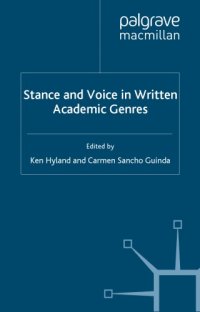
Ebook: Stance and voice in written academic genres
Author: Ken Hyland, Carmen Sancho Guinda
- Year: 2012
- Publisher: Palgrave Macmillan
- City: Houndmills, Basingstoke, Hampshire ; New York
- Language: English
- pdf
Stance and voice are among the most significant concepts in writing theory and pedagogy today. Referring to the ways we express a point of view and engage with others, the terms are particularly controversial in the domain of academic writing, long considered a faceless and impersonal kind of discourse. But while corpus research shows that stance is scarcer in academic genres than in many other contexts, the complex Read more...
Content: Introduction; K. Hyland & C. Sancho-Guinda --
Current Conceptions of Stance; B. Gray & D. Biber --
Current Conceptions of Voice; C. Tardy --
Voice and Stance as APPRAISAL: Persuading and Positioning in Research Writing Across Intellectual Fields; S. Hood --
Stance in Academic Bios; P. Tse --
Hedging, Stance and Voice in Medical Research Articles; A. Gross & P. Chesley --
Authorial Voice in Textbooks: Between Exposition and Argument; M. Bondi --
Achieving a Voice of Authority in PhD Theses; P. Thompson --
Undergraduate Understandings: Stance and Voice in Undergraduate Reports; K. Hyland --
Voice in Student Essays; P.K. Matsuda & J.V. Jeffery --
Proximal Positioning in Students' Graph Commentaries; C. Sancho-Guinda --
Stance and Voice in Academic Discourse Across Channels; A. Hewings --
Voice and Stance Across Disciplines in Academic Discourse; M. Silver --
Variation of Stance and Voice Across Cultures; K. Flttum --
The Voice of Scholarly Dispute in Medical Book Reviews 1890-2010; F. Salager-Meyer, M. Ariza & M. Briceo --
Epilogue; D. Cameron.
Abstract: Stance and voice are among the most significant concepts in writing theory and pedagogy today. Referring to the ways we express a point of view and engage with others, the terms are particularly controversial in the domain of academic writing, long considered a faceless and impersonal kind of discourse. But while corpus research shows that stance is scarcer in academic genres than in many other contexts, the complex and distinctive ways scholars and students present their attitudes to their texts, their readers and their content offer a rich area of study for discourse analysts and students of academic writing. This book reappraises the notions of stance and voice and reconsiders their relevance in applied linguistics, showing their expression and impact in a broad range of written academic genres